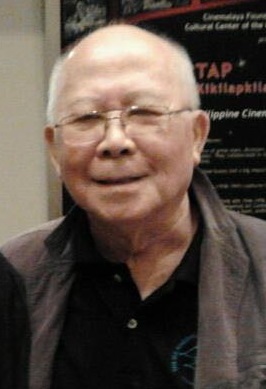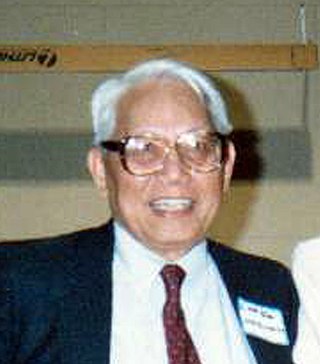
Francisco Balagtas y de la Cruz, commonly known as Francisco Balagtas and also as Francisco Baltasar, was a Filipino poet and litterateur of the Tagalog language during the Spanish rule of the Philippines. He is widely considered one of the greatest Filipino literary laureates for his impact on Filipino literature. The famous epic Florante at Laura is regarded as his defining work.
Francisco "Franz" Arcellana was a Filipino writer, poet, essayist, critic, journalist and teacher.

Teodoro Andal Agoncillo was a prominent 20th-century Filipino historian. He and his contemporary Renato Constantino were among the first Filipino historians renowned for promoting a distinctly nationalist point of view of Filipino history. He was also an essayist and a poet.
Philippine literature in English has its roots in the efforts of the United States, then engaged in a war with Filipino nationalist forces at the end of the 19th century. By 1901, public education was institutionalized in the Philippines, with English serving as the medium of instruction. That year, around 600 educators in the S.S. Thomas were tasked to replace the soldiers who had been serving as the first teachers. Outside the academe, the wide availability of reading materials, such as books and newspapers in English, helped Filipinos assimilate the language quickly. Today, 78.53% of the population can understand or speak English.

Bienvenido L. Lumbera was a Filipino poet, critic and dramatist. Lumbera is known for his nationalist writing and for his leading role in the Filipinization movement in Philippine literature in the 1960s, which resulted in his being one of the many writers and academics jailed during Ferdinand Marcos' Martial Law regime. He received the Ramon Magsaysay Award for Journalism, Literature and Creative Communications in 1993, and was proclaimed a National Artist of the Philippines for literature in 2006. As an academic, he is recognized for his key role in elevating the field of study which would become known as Philippine Studies.
Gémino Henson Abad is an educator, writer, and literary critic from Cebu, Philippines. He is a National Artist for Literature of the Philippines.

Jose Y. Dalisay Jr. is a Filipino writer. He has won numerous awards and prizes for fiction, poetry, drama, non-fiction and screenwriting, including 16 Palanca Awards.

Néstor Vicente Madali González was a Filipino novelist, short story writer, essayist and, poet. Conferred as the National Artist of the Philippines for Literature in 1997.
Epifanio San Juan Jr., also known as E. San Juan Jr., is a known Filipino American literary academic, Tagalog writer, Filipino poet, civic intellectual, activist, writer, essayist, video/film maker, editor, and poet whose works related to the Filipino Diaspora in English and Filipino writings have been translated into German, Russian, French, Italian, and Chinese. As an author of books on race and cultural studies, he was a "major influence on the academic world". He was the director of the Philippines Cultural Studies Center in Storrs, Connecticut in the United States. In 1999, San Juan received the Centennial Award for Achievement in Literature from the Cultural Center of the Philippines because of his contributions to Filipino and Filipino American Studies.
Isagani R. Cruz is a Filipino writer and literary critic.

Virgilio Senadren Almario, better known by his pen name Rio Alma, is a Filipino author, poet, critic, translator, editor, teacher, and cultural manager. He is a National Artist of the Philippines. He formerly served as the chairman of the Komisyon sa Wikang Filipino (KWF), the government agency mandated to promote and standardize the use of the Filipino language. On January 5, 2017, Almario was also elected as the chairman of the National Commission for Culture and the Arts (NCCA).
Domingo Goan Landicho, was a Philippine writer and academic.

Ophelia Alcantara Dimalanta was a Filipina poet, editor, author, and teacher. One of the country's most respected writers, Dimalanta published several books of poetry, criticism, drama, and prose and edited various literary anthologies. In 1999, she received Southeast Asia's highest literary honor, the S.E.A. Write Award.

In the Philippines, a baklâ, bayot (Cebuano) or agî (Hiligaynon) is a person who was assigned male at birth and has adopted a gender expression that is feminine. They are often considered a third gender. Many bakla are exclusively attracted to men and some identify as women. The polar opposite of the term in Philippine culture is tomboy, which refers to women with a masculine gender expression. The term is commonly incorrectly applied to trans women.

Irma Santonil Adlawan is a Filipino stage, television and film actress. She is dubbed as the “Queen of Independent Cinema” for her acting prowess and exceptional contribution to the Philippine film industry.
Ricaredo Demetillo was a Filipino essayist, poet, and playwright. Demetillo was one of the most important and prolific literary figures in the Philippines during the Twentieth Century and has won numerous awards for his writing.

Hermenegildo Cruz (1880–1943) was a Filipino writer and prominent trade union organizer. He was a founding member of various trade union organizations in the Philippines, notably of Unión Obrera Democrática Filipina, and was a member of the Philippine Assembly. He became assistant director of the Bureau of Labor from 1918 to 1922 and eventually its director from 1922 to 1935.
Buenaventura Perez Rodriguez was a playwright, the governor of Cebu, Philippines from 1937 until 1940, and a member of the House of Representatives for two terms. He was the first Cebu governor of the Philippine Commonwealth.
Luis H. Francia is a Filipino American poet, playwright, journalist, and nonfiction writer. His memoir, Eye of the Fish: A Personal Archipelago, won both the 2002 PEN Open Book and the 2002 Asian American Literary Awards.









